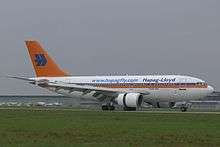Hapag-Lloyd Flug
 | |||||||
| |||||||
| Founded | 1972 | ||||||
|---|---|---|---|---|---|---|---|
| Ceased operations | 3 April 2007 (became TUIfly) | ||||||
| Hubs | |||||||
| Alliance | TUI Airlines | ||||||
| Fleet size | see TUIfly | ||||||
| Destinations | see TUIfly | ||||||
| Parent company | TUI Group | ||||||
| Headquarters | Flughafenstrasse 10, Hannover, Germany[1] | ||||||
| Key people | Christoph R. Müller | ||||||
| Website | Hapagfly.com | ||||||
Hapag-Lloyd Flug (between 2005 and 2007 also marketed as Hapagfly) was an airline based in Langenhagen, Lower Saxony, Germany.[2] It operated scheduled and charter passenger flights, mainly to holiday resorts in Europe. In January 2007 in a restructuring, it combined its operations with Hapag-Lloyd Express to become TUIfly,[3] for which it operated all flights, while Hapag-Lloyd Express marketed them until TUIfly got its own license.
History
The original HAPAG company first became involved in the aviation industry in 1910, sponsoring Zeppelin flights.
Hapag-Lloyd Flug was established in July 1972, when the Hapag-Lloyd shipping group bought a few Boeing 727s to fly its cruise passengers from Germany to the ports of call for the cruises. It began operations on 30 March 1973. Through the years, the airline added regular passenger flights to its schedule, as well as new airplanes, such as the Boeing 737-800 and Airbus A310 aircraft. In 1979, Bavaria Germanair, a charter air carrier operating Airbus A300B4 and British Aircraft Corporation BAC One-Eleven series 400 and 500 jets, was merged into Hapag-Lloyd Flug. Since 1997, it has been a subsidiary of TUI AG, which also includes the Hapag-Lloyd cargo container line and cruise line.
In November 2005, the airline changed its name to Hapagfly due to the new marketing strategy of the TUI Group. In January 2007, it was merged into the new cooperation TUIfly with Hapag-Lloyd Express.
Destinations
Hapagfly operated services mainly to European holiday resorts. Most of them are now operated by TUIfly.
Fleet
_(2410285784).jpg)

Over the course of its life, Hapag-Lloyd Flug operated all of the following aircraft, primarily through aircraft leasing from companies such as International Lease Finance Corporation (ILFC) and GECAS. It is also the first operator of the most popular Boeing 737-800 Next Generation series that first commenced operations in 1998.
| Type | Number of aircraft | Notes | |
|---|---|---|---|
| Operated | In service | ||
| British Aircraft Corporation BAC One-Eleven series 500 | 4 | 0 | Formerly operated by Bavaria Germanair |
| Boeing 727-100 | 7 | 0 | |
| Boeing 727-200 | 3 | 0 | |
| Boeing 737-200 | 6 | 0 | |
| Boeing 737-400 | 12 | 0 | |
| Boeing 737-500 | 5 | 0 | |
| Boeing 737-800 | 33 | 32 | Type operated at time of 2007 merger |
| Airbus A300B4 | 10 | 0 | Formerly operated by Bavaria Germanair |
| Airbus A310-200 | 4 | 0 | |
| Airbus A310-300 | 7 | 0 | |
Incidents and accidents
12 July 2000: Hapag-Lloyd Flight 3378, an Airbus A310 flying from Chania to Hannover, was involved in a highly publicized incident, after suffering fuel starvation caused in part by the crew's decision to continue the flight despite faulty landing gear that had partially retracted. All 150 people aboard survived the crash landing in Vienna.
References
- ↑ "Airline Membership". IATA. Archived from the original on July 11, 2015.
- ↑ "Facts and Figures." Hapagfly. 1 June 2005. Retrieved on 29 May 2009.
- ↑ Flight International 3 April 2007
External links
![]() Media related to Hapagfly at Wikimedia Commons
Media related to Hapagfly at Wikimedia Commons
- (in German) Hapagfly (Archive)
- (in English) Hapagfly (Archive)
- (in German) Hapag-Lloyd Flug (Archive)
- (in English) Hapag-Lloyd Flug (2001 Archive)
- Hapagfly Fleet
- Hapagfly Fleet Age